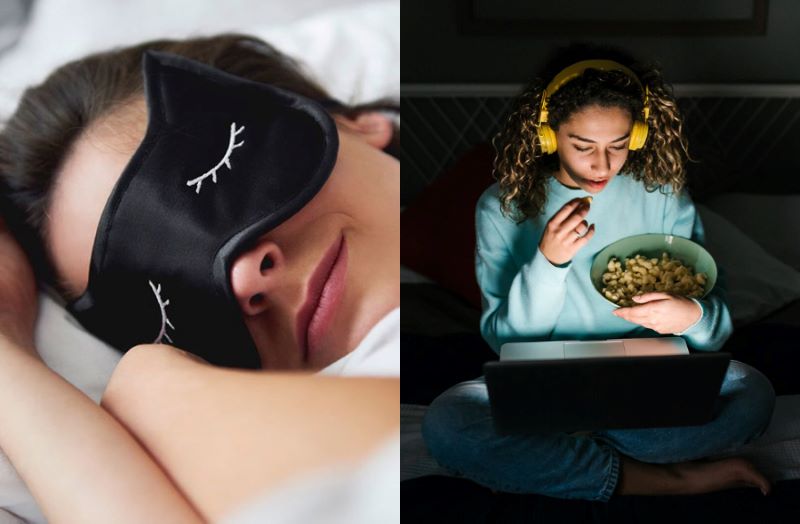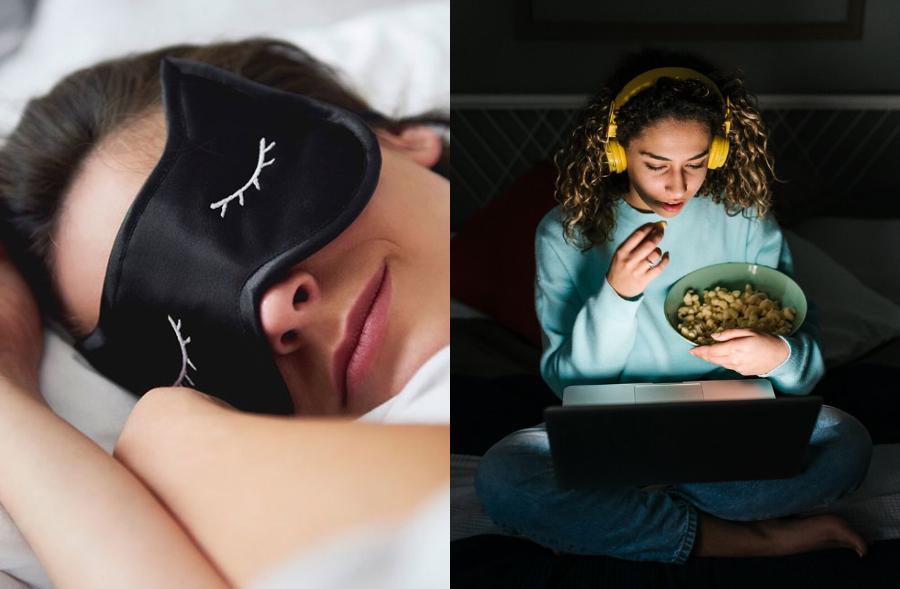Pre-sleep habits can play a significant role in weight loss by influencing your metabolism, hormone levels, and even impact your next day’s appetite. Having a pre-sleep routine is important for having a restful and sound sleep because sleep deprivation has been linked to weight gain, most of it on and around the belly. Experts say sleeping for less than 5 hours can increase the appetite by a great degree the next day, where you can consume up to 300 calories extra than normal. Researchers have also found that people who get only 4 hours of shut-eye had a 9% increase in belly fat than people who managed to sleep soundly for 9 hours. In short, when the body gets less hours of sleep, it tends to redirect fat to the waist. Now that we have established that a goodnight’s sleep is important for weight loss, there could be several pre-sleep habits that you might unknowingly engage in, which could be hindering your weight loss efforts.


Here are some pre-sleep habits that are not letting you lose weight:
1. Having a Heavy, Spicy Dinner:
The pre-sleep routine starts with having an early dinner, preferably before 7 pm. But do avoid heavy, high-carb, high-calorie, spicy meals close to bedtime because they can cause digestive discomfort such as bloating, indigestion, and acid reflux. These discomforts can make it difficult to fall asleep or stay asleep throughout the night. High-carb meals can cause spike and in blood sugar followed by crash, it can trigger hunger and cravings for more high-calorie foods, leading to late-night binge eating, which can lead to weight gain. Instead have a light, protein-rich dinner, particularly the ones that have amino acid “tryptophan” (milk, oats, cheese, nuts, seeds, chicken, etc.), since it helps in the production of serotonin which in turn helps to produce melatonin, which regulates sleep-wake cycle. Additionally, protein helps repair and build muscles and helps burn more calories – a win-win situation! Check out such healthy protein-rich meal plans on the Rati Beauty diet.

2. Staying Glued To Gadgets On the Bed:
Blue light emitted from phones and other gadgets tend to interrupt with the body’s natural circadian rhythm. The circadian rhythm, our body’s internal clock, influences hormone secretion, metabolism, and sleep patterns, all of which have a great influence on weight loss. When our internal clock is aligned with daily activities, hormone levels are optimized for appetite control, metabolism is robust, and we sleep better and wake up with lots of energy the next day, all of which contribute to successful weight management. Keep all the gadgets, including your phone away one hour before bedtime to sleep like a baby!
3. Snacking on Sweets and Sugary Drinks:
Foods containing refined carbohydrates and added sugars can lead to rapid spikes in blood sugar levels, followed by a subsequent crash. This spike in blood sugar triggers the release of insulin, which helps transport glucose into cells for energy use. However, the rapid decrease in blood sugar after the initial spike can leave you feeling hungry again shortly afterward. This hunger may prompt late-night snacking, contributing to weight gain over time. To promote better health and weight management, it’s advisable to avoid dessert after dinner, opting instead for healthier alternatives like kiwi to satisfy sweet cravings. Kiwi is not only lower in calories and sugar compared to many desserts but also contains serotonin, a neurotransmitter that can help promote relaxation and improve sleep quality, making it a healthier choice for bedtime snacking. By making these dietary adjustments, you can support better sleep and overall well-being while reducing the likelihood of late-night cravings and weight gain.
4. Having Coffee Close to Bedtime:
While a morning cup of coffee can provide a much-needed boost to start the day, indulging in caffeine too close to bedtime can affect both sleep quality and weight loss efforts. The stimulant properties of caffeine can linger in the body for several hours, potentially keeping you awake for up to 6 to 8 hours after consumption. This disruption in sleep can hinder the body’s natural restorative processes and lead to fatigue the next day. Caffeine can interfere with sleep patterns, causing restlessness and making it harder to fall asleep or stay asleep throughout the night. These disruptions in sleep can negatively impact hormone regulation, appetite control, and metabolism, all of which are essential factors in weight management. Therefore, it’s advisable to avoid consuming caffeine, such as coffee, at least 6 hours before bedtime to support weight loss goals. Opting for caffeine-free alternatives or herbal teas in the evening can help promote relaxation and improve sleep without interfering with weight loss efforts. Also read: “5 Easy Coffee Weight Loss Drinks.”
5. Not Relaxing Before Sleeping:
Stressing about the next day, stressing about love life, work life, relationships, can all affect while lying in the bed, and believe it or not can trigger late-night cravings. Negative thoughts and stress can trigger emotional eating or late-night cravings as a coping mechanism to soothe stress or distract from negative emotions. Stress activates the release of hormones like cortisol, which can increase appetite and drive cravings for high-calorie, comfort foods. Additionally, stress can disrupt sleep patterns, leading to fatigue and further exacerbating cravings for energy-dense foods as a means of boosting mood and energy levels. Therefore, managing stress through relaxation techniques, listening to music, can help to essential not only for improving sleep quality but also for maintaining healthy eating habits and supporting overall well-being.
In conclusion, prioritizing healthy bedtime habits is crucial for achieving and maintaining weight loss goals. As mentioned above, quality and duration of sleep, influenced by presleep routines and behaviors, play a significant role in regulating metabolism, hormone levels, and overall energy balance. By getting rid of these habits can help you sleep better and reach weight loss goals soon.
5 Easy Coffee Weight Loss Drinks
Can I Lose Weight By Eating 1000 Calories in a Day?





